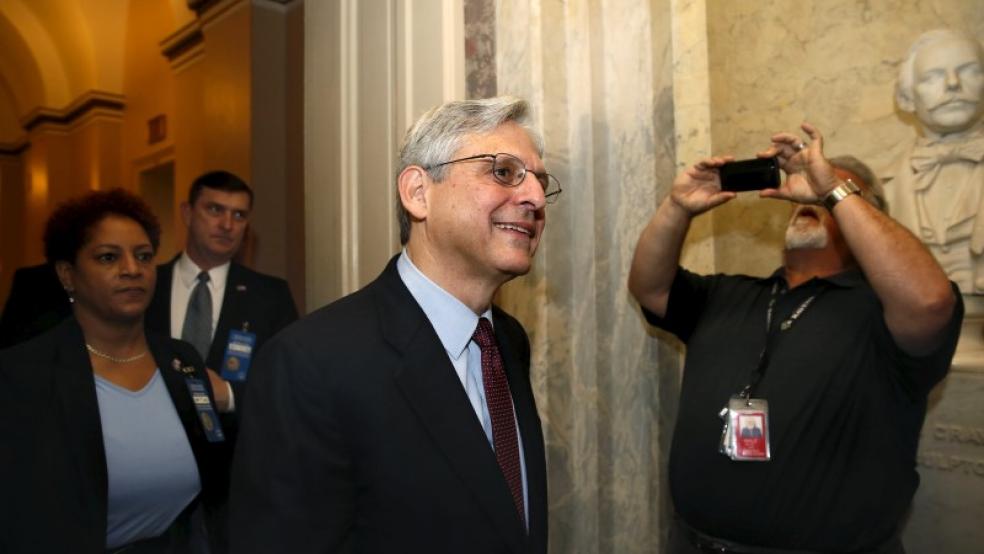Congressional Republicans’ reluctance to even consider, much less vote on, President Obama’s nominee to fill the Supreme Court seat left vacant by the death of Justice Antonin Scalia is infuriating to the president’s supporters and even baffling pundits who generally find fault with both sides in most political disputes.
The GOP has manufactured a fake rule: They claim that no president in the final year of his second term should be given the chance to place a new justice on the high court. This is plainly nonsense, as senior GOP lawmakers have admitted, and is not supported by law or by precedent.
Related: Obama Makes the Senate a SCOTUS Offer It Can’t Refuse (but Will Anyway)
Republican leaders might have handled it better. Justice Scalia’s death had hardly been announced before Senate Majority Leader Mitch McConnell rushed out a statement saying that no successor should be named until 2017, when a new president is selected. McConnell and Sen. Chuck Grassley of Iowa, who chairs the Senate Judiciary Committee, later made it clear that they would refuse a hearing and a vote to anybody nominated by President Obama, sight unseen.
They could have achieved the same objective without appearing so nakedly partisan, simply by holding a hearing and using the majority on the Judiciary Committee to vote down the nominee.
But if McConnell and Grassley jumped the gun, it’s because unexpected death of one of the court’s most conservative jurists is, for Republicans and their constituents, a huge deal.
With Scalia on the Court, the nine justices were split between four liberals, four conservatives, and one swing vote, Anthony Kennedy, who tends to side with the conservatives on most issues. Conservatives didn’t always get what they wanted from the Court – Obamacare is still the law of the land and anti-gay marriage laws were ruled unconstitutional, for example. However, the current conservative majority also handed the right huge victories.
Related: A New Supreme Court Justice by Spring 2017? Don’t Count on It
Citizens United opened the floodgates for unlimited campaign contributions from individuals to political candidates. Burwell v. Hobby Lobby took a chunk out of the Affordable Care Act by blocking the administration from requiring non-profits to provide health insurance that includes some forms of birth control. Shelby County v. Holder struck down a law meant to assure that the voting rights of minorities were respected in states with a history of racial discrimination.
All of those cases, and many like them, would have gone the other way in a court with a liberal majority.
The appointment of a liberal judge by President Obama would change the composition of the court dramatically. The liberal wing would have a permanent 5-4 advantage, with the added cushion of Kennedy, who sometimes sides with them.
There are multiple cases on the court’s current docket alone that the addition of a more liberal justice might affect in ways conservatives would dislike.
Related: Here’s Why the SCOTUS Battle Could Get So Much Worse
Friedrichs v. California Teachers Association, a case challenging the legality of public sector unions to collect fees from non-members who benefit from the unions’ collective bargaining. A lower court ruled in favor of the union, ironically at the request of the plaintiff, in order to speed the case to the high court. Now, a 4-4 decision would let the lower court ruling stand, at least until the case could be heard again by a 9-member court.
In Evenwel v. Abbott, the court is considering a suit challenging the drawing of election districts in Texas, in a case that could have implications across the country, potentially giving more rural, conservative districts an advantage in terms of legislative power. The loss of Scalia here makes a conservative victory unlikely as well.
And then there’s the issue of future cases. The conservative dream scenario, a court that would accept a challenge to the Roe v. Wade decision legalizing abortion, is currently a single vote away. That means that if the next president is a Republican, it’s possible that the court might overturn a despised precedent.
It’s also possible that a liberal court will start tinkering with rulings – like Citizens United – that the GOP would generally prefer to protect. (The court’s historic adherence to the principle of stare decisis, under which settled decisions were not revisited except under extraordinary circumstances, has largely gone by the boards in recent years.)
So, while the Senate Republicans’ no-holds-barred resistance is unprecedented and arguably anti-democratic, its roots are plainly sunk deep in conservatives’ well-justified worry that the change of a single vote on the Court could – and likely will – change everything.





